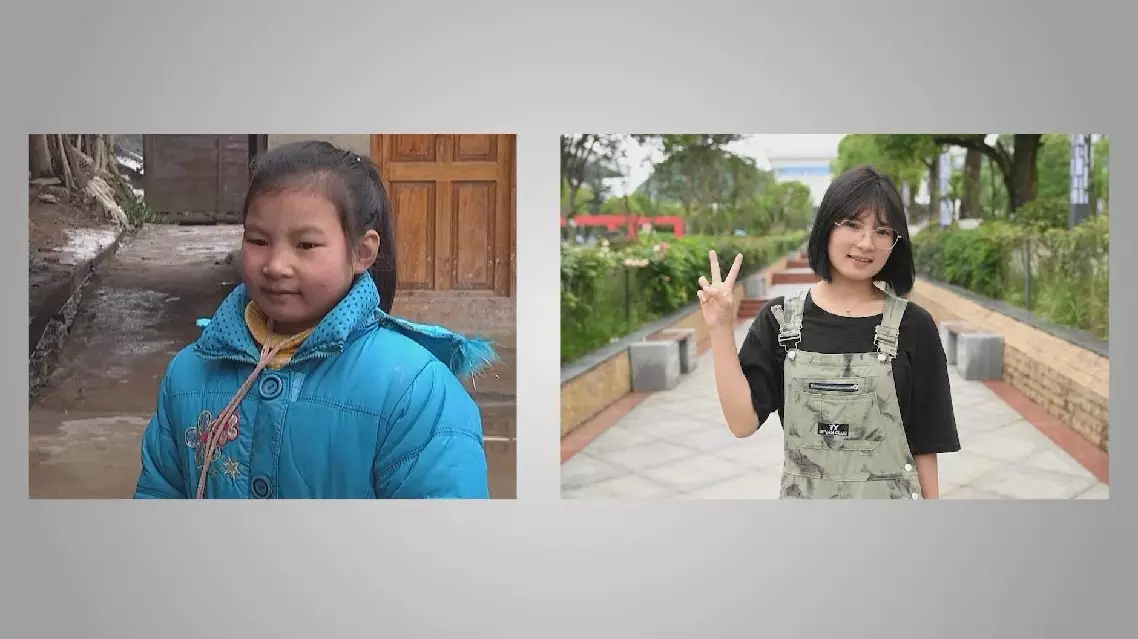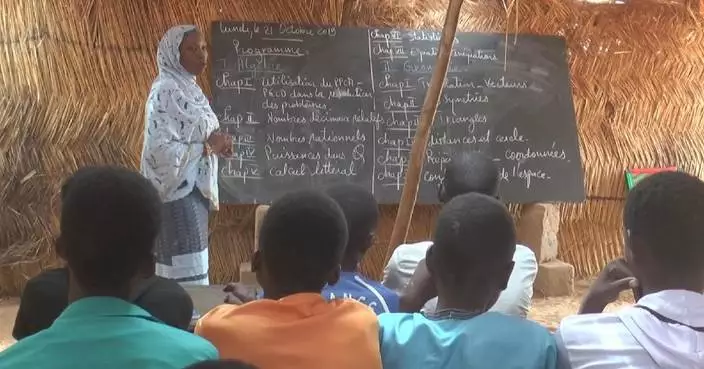Rongjiang County in southwest China's Guizhou Province has undergone a remarkable transformation from a region once burdened by extreme poverty into a booming tourist destination, offering its children newfound opportunities to achieve their dreams.
This turnaround is partly driven by China's Village Super League, or "Cun Chao," which started in Rongjiang County last year and quickly gained popularity both in China and internationally. The tournament has significantly boosted tourism in the region.
From May to July this year, 20 teams from Rongjiang County are participating in the "Cun Chao" tournament every Friday, Saturday, and Sunday.
The events feature the Baiwang Wooden Drum Dance, a national intangible cultural heritage, showcasing the enthusiasm and optimism of the local people.
Drum dance performers like Long Jiantao were relocated with their families from the remote Baiwang Village in the "Moon Mountain" area to Rongjiang County as part of a poverty alleviation program a decade ago.
Long was just months old when his parents moved to another province to work twelve years ago. His two older sisters stayed in Baiwang, and the siblings attended a rundown and overcrowded elementary school with limited teachers and resources. This dilapidated school was their only chance to escape the mountains, offering little hope of following their dreams beyond their village.
In 2013, Baiwang Village was included in a relocation program, and Long's family moved to Fengle Community in Rongjian County to start a new life. As life in the county improved, his parents returned to Rongjiang for work, reuniting the family.
Longs eldest sister, Long Qiaofeng, is now pursuing a degree in big data and accounting at a vocational college in Guiyang City, a stark contrast to the grim, cramped schoolhouse of their childhood.
"I want to find a job I enjoy and then take care of my younger brother, just as my dad did. Dad has taught us that we should take on responsibility, work hard, and also care for the family. He has worked hard for us for so long, now it's time for us to take care of him," she said.
Pan Yinmei, a former classmate of Long Qiaofeng in Baiwang, is now studying at an agricultural vocational college. Students here from registered poverty-stricken households receive 3,500 yuan (about 480 U.S. dollars) in annual tuition waivers, 2,500 yuan (about 340 U.S. dollars) in national student aid, and an additional 1,000 yuan (about 140 U.S. dollars) from poverty alleviation funds.
"My life has improved a lot -- I can eat well, dress well, and my university life is very happy and fulfilling with plenty of free time," Pan said.
Shi Zhenghua, the former principal of the village school, is now a math teacher in Rongjiang County. Having witnessed the transition from the remote mountain area to the town, he has seen dramatic improvements in the children's learning environment.
"The changes are enormous. It's like two different worlds. Before, the school dormitory was truly in a state of utter disrepair. Back then, we had very few teachers, and the children could not learn anything they wanted. But look at us now. We have over 100 teachers. Football, basketball, music...they can learn whatever they want. Since 2013 when the students from Baiwang were relocated, 48 of them have gone on to pursue post-secondary education," Shi said.
Since 2012, more than 15,000 people from the heart of the "Moon Mountain" area have relocated to the town. To ensure a better quality of life for the relocated residents, the local government has built hospitals, schools, industrial parks, and recreational facilities around the resettlement communities.
Since 2015, Guizhou has implemented the largest-scale population relocation for poverty alleviation in the country. A total of 1.92 million people have moved from remote mountainous areas to more livable towns and cities, fundamentally solving the poverty issue that had long plagued Guizhou.

Relocation program allows children from remote area in Guizhou to follow their dreams
A freelance writer from Australia has decided to become a permanent resident in China after living and working in Guangdong for 20 years, during which he has cycled through the country to see a real China and has witnessed the significant changes in the country.
Jerry Grey, 66, made his home in Zhongshan City of south China's Guangdong Province in 2004. The night he arrived in the city, he realized he had been misinformed about China.
"This used to be a supermarket. And my first day here, it was very late at night, 11, 12 o'clock at night. I got out of the car and walked through the supermarket and saw all the things that I carried with me from Australia. I had new shampoos and body washes and razor blades, all the things that I was told online you can't get these things in China, so you better buy them before you go. So I bought them all in Australia and carried them all to China. And I was misinformed. I didn't need to buy any of these things at all, because they're all cheaper here as well. I had to pay excess baggage in the airline because I was carrying so much weight. So that was a very strange experience. I also bought two bottles of Australian wine. And I can buy that in the supermarket, too," Grey said.
While serving as an English teacher at a foreign language school in Zhongshan, Grey spent a lot of his spare time traveling across China and fell in love with the welcoming people, beautiful landscapes, local cuisines, and a Chinese woman, who became his wife in 2009.
In 2014, Grey made a "crazy" decision to travel to Xinjiang by bicycle with a photographer friend, who is also a foreign expatriate.
"We left Zhongshan, traveled north into Hunan, and then Hubei, and then turned slightly northwest through Shaanxi, and then into Gansu, Ningxia, and across to Xinjiang. So that was quite an extended ride. That was 5,000 kilometers," Grey said.
It took them 57 days to finish that trip and finally see the magnificent views around Tianshan Mountains in Xinjiang.
"And the idea is that we want to see China. One of the most incredible things about riding a bike is the authenticity of the country, the real part of China," Grey said.
Grey has published a picture album titled "57 Days across China" to keep his memories alive and show people what he had seen during the journey. The funds raised from sales of the books have been used to help the people with disabilities in Zhongshan.
Over the past decade, Grey has ridden 35,000 kilometers in China, and his wife Liang Yuhua joined him in 2019.
In doing so, they have raised significant sums of money for people with disabilities and witnessed impressive changes in villages, where wide roads, modern home-stay hotels and restaurants have become common features in the past few years.
"In 2019, I noticed the significant changes when riding with Jerry. Especially, some rural areas are so clean that we didn't see any garbage. And the waste classification bins were placed neatly. So I told Jerry, 'see how great the changes that have happened in China over the years'," Liang said.
After retirement, Grey became a freelance writer. He has been posting videos on social media about what he has seen in China, including the Shenzhen-Zhongshan Link and the Village Basketball Association, an amateur rural basketball event that has become a nationwide sports phenomenon.
In recent years, Grey is impressed by the increasingly easier life in China, even for foreign travelers.
"So foreigners can actually open bank accounts in China. They can use WeChat and Alipay very, very simply as long as they're prepared before they arrive. Chinese payments are as convenient as it is possible to be," Grey said.
A few days ago, Grey went to the immigration office of Zhongshan and applied for a foreign permanent resident ID card.
"I think the time is right. I've lived here for 20 years, but for most of that time, I lived here on working permits and residence visas. Then when I retired from work, I'm on a spousal visa. And I think the time is right, because it gives me the card that I can travel around China without carrying my passport. And it becomes much more convenient. It's going quite smoothly. At the moment, we're waiting for the police checks to come back," he said.

Australian expat sees real China on bicycle










